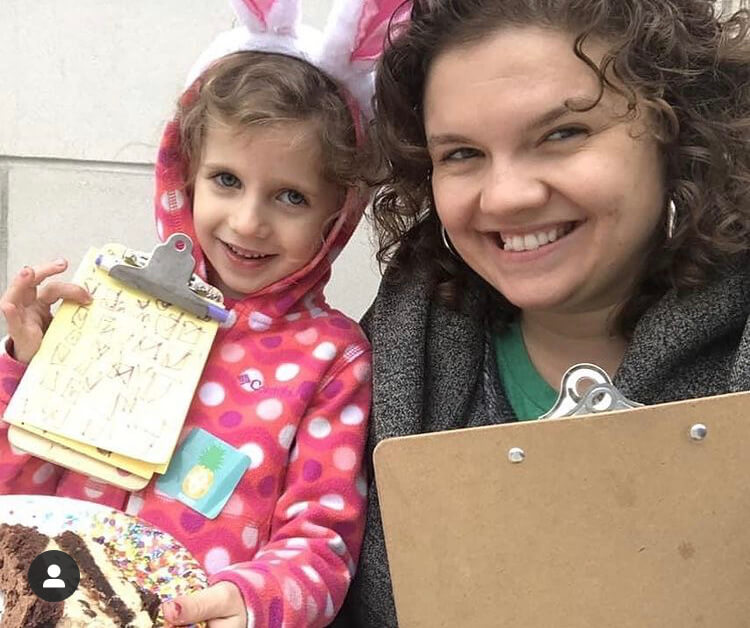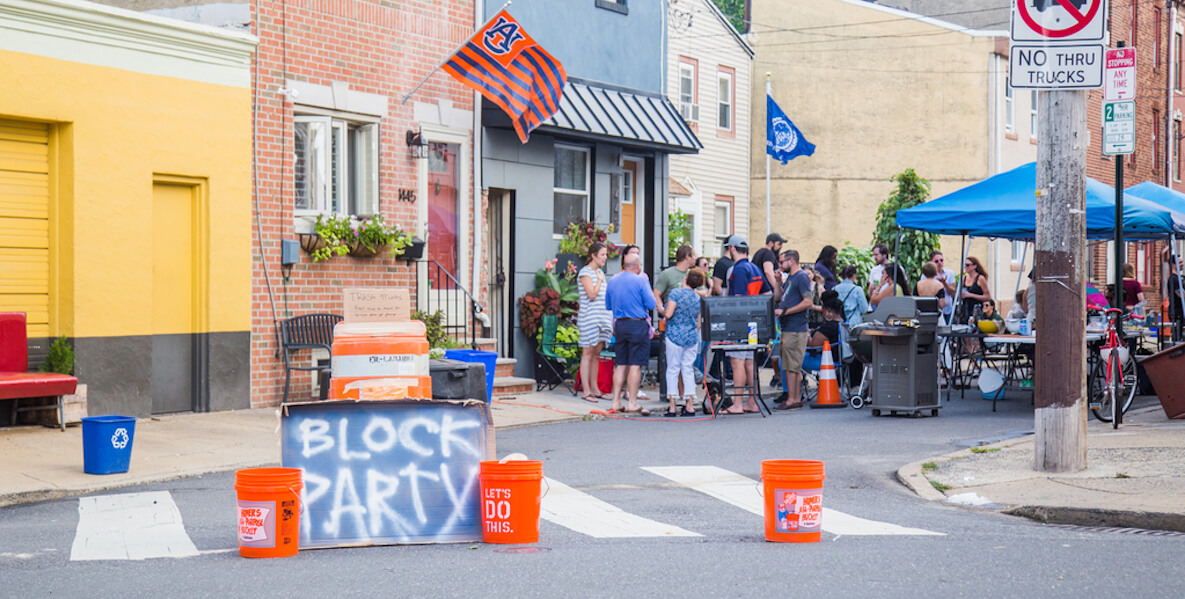Jen Devor has been a liaison between her neighbors and the City since she moved to Point Breeze in 2005.
An extrovert armed with a computer, Devor says her tech savvy reputation led her to become the “go-to” person for submitting 311 requests, applying for permits and navigating utility or construction issues on the street early on.
But while she always loved helping her neighbors, she says she realized that accessing city services came with a lot of challenges. She had heard that blocks with a designated block captain had an easier time accessing city services and decided to apply. Becoming a block captain felt like a natural and necessary transition.
MORE HELPFUL GOOD-CITIZENSHIP RESOURCES
Philadelphia’s block captain program operates under the Philadelphia More Beautiful Committee (PMBC), an effort to unite people with their neighbors, and “build a vision for a clean and beautiful block.” Block captains are unpaid positions that come with the responsibilities of hosting parties, organizing trash cleanups and making (a lot of) phone calls.
Devor, co-founder of community engagement nonprofit Better Civics (and an occasional Citizen contributor), says navigating city services remains difficult, even in her current position. But being able to centralize resources for her neighbors, and form relationships with people at the city level, helps make the process run smoother.
Devor uses her position not only to connect neighbors with the city, but with each other. While some tasks are exciting and others are more tedious, she says she loves being the block captain in her community, and feels that her work is appreciated.
Sound like something you’d be into? First, check to see if you already have a block captain—call 215-685-3971, or ask your neighbors. If no one’s doing the job yet here’s how you can make it yours—and serve your neighbors well.
- Decide if you have what it takes
The block captain program runs on neighborhood engagement—if you’re not a people-person, it may not be for you.
“It would be unfortunate if somebody signed up to be a block captain, and then just completely ghosted their neighbors,” Devor says. If you feel confident you can commit to talking to your neighbors, picking up a phone and talking to the city, and then reporting back, read on.
- Apply to be a block captain—here’s how
Apply for a printable petition, here, or call (215) 685-3981 to have a petition sent via mail. Once you have your petition, you will need to get the majority of the folks who live on your block to sign it (at least 51 percent of households). If you’re successful, mail it to the PMBC at 2601 W. Glenwood Ave. You should receive an official block captain card in the mail once you’re approved. That’s it! Now you’re a block captain.
- Make sure neighbors know who you are

Jen Devor and her daughter Ava Devor—”#1 canvassing partner”
Devor carries a clipboard and (at times) business cards with her contact information and photo. While she says she wouldn’t typically put a photo on a business card, she likes the idea that her neighbors can recognize her, especially if they are new to the block.
Business cards don’t need to be in every block captain’s tool box. Just make an effort to engage with your neighbors in-person and give out your contact information through other methods—flyers, word of mouth, email, etc,—to ensure you are reachable when needed.
- Choose your own adventure
“There’s not one unified job description for the block captain: You’re not being paid for it, you’re not being graded on it.” Devor says. “The beauty of it is that you can really do what you want with it.”
Think about how you want to guide neighborhood interactions. What do you enjoy? And what do you and your neighbors enjoy doing together?
Maybe you want to put a new spin on the yearly block party, or start a mini block captain program to engage neighborhood kids. Maybe you want to start a little free library, or see if you are eligible for Playstreets. Spend some time finding out what the neighborhood wants and needs, then go to it.
- Facilitate communication among neighbors
As a block captain, you can choose how to communicate with your neighbors. For example, you could start a private Facebook page to post regular updates and provide a place where neighbors can engage with each other.
For neighbors who aren’t tech savvy, Devor uses other methods. She knocks on doors, talks to people in the streets, and hands out flyers.
See what works on your block—a combination of digital and in-person outreach will likely be most effective.
- Respond to neighbor complaints
“I like to joke around that being a block captain is like, you’re the complaints department,” Devor says. “Anytime something is wrong, somebody comes to you.”
“Complaints department” responsibilities can range from giving someone an email address to contact for a property issue, calling 311 on behalf of a neighbor, or standing outside waving a clipboard during a power outage, Devor says.
“Early on in my block captain run, all the power on our street went out,” Devor says. “I get outside and all the neighbors are out there, and they’re like Jen, Jen, we were gonna come knock on your door! Are you gonna call PECO? And I was like, This is amazing.”
What followed was a block-wide hang out, with neighbors chatting with each other and bringing out water to beat the summer heat, she adds. “We got through this minor crisis, but it set the tone for how we act as a block,” Devor says. “We support each other.”
Devor says she loves creative problem solving and even enjoys the challenge of battling bureaucracy—both crucial in being able to make stuff happen for your neighbors.
- Be a mouthpiece for your community
A block captain should be able to advocate for, and connect, their neighbors to city services. The extent to which you are involved in their needs, however, may depend on your neighbors’ email or phone literacy.
Think about it on a case-by-case basis whether you need to reach out to the city on a neighbor’s behalf, or simply direct them to the correct phone number or email address. (Consider your own energy levels and capacity, too.)
- Set your own boundaries
Block captains like Devor manage work and family life outside of their neighborhood duties. In order to take care of yourself and keep tasks in balance, it’s crucial to set boundaries, she says.
For instance, some people are under the impression that the block captain is supposed to clean the block—by themselves.
“It’s my responsibility as a homeowner to clean my house and my street, and be an active member of my block,” Devor says. “But it’s not like, Oh, you’re block captain, you have to sweep the block every week.” Instead, facilitate group efforts by organizing block clean-ups with your neighbors.
You also may want to limit the hours during which your neighbors can contact you (if there’s an emergency, they should be calling 911).
- Include everyone, really
A few years ago, Devor gathered signatures from her neighbors to apply for permit parking on their street. She went door-to-door and talked to every neighbor. “You can’t say, I’ve talked to everyone on the block except for the two people that are renting, even if you have enough signatures for a permit or talked to the more active neighbors,” Devor says.
She heard both enthusiasm and hesitation, but in the end the majority signed in favor of applying for the permits, which they later secured. It was one of the biggest projects Devor led as block captain, she said.
“You really have to talk to everybody, disperse information in an equal and fair way, and make sure that everyone feels like they have a piece of the pie,” she says.
In a perfect world, we’d all get along with our neighbors. But in reality, there are often a few people we either don’t know or don’t like. As a block captain, it’s important to put these biases—even subconscious biases—aside and make sure you are truly talking to everyone and considering all opinions.
- Know when to step down
Regardless of how much you love being a block captain, at some point you’ll probably need to step down. Maybe you no longer have the energy for the commitment, or maybe someone else has volunteered to take your place. Prepare for a transition by having open conversations with your neighbors about what they envision for the future of the block.
“[I’ll serve] for as long as my block needs me to,” Devor says. “But like any position in a democracy, if somebody else wanted to be block captain, I am more than open to pass the torch.”
Header image courtesy of Visit Philly



